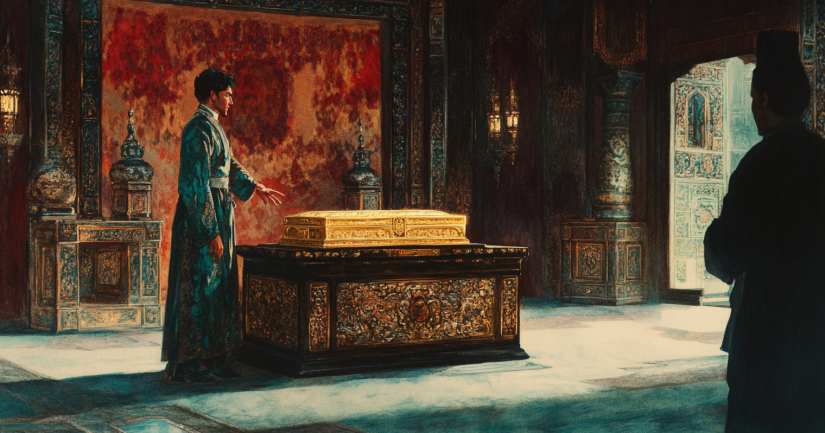
Discover the tension and emotion of Act 2 Scene 7 with our Merchant of Venice Quiz. This scene transports you to the opulent court of Belmont, where suitors face the challenge of choosing the right casket to win Portia’s hand. Here, you will immerse yourself in the rich tapestry of choices and consequences. The stakes are high, and the tension is palpable.
In this quiz, you’ll explore the themes of appearance versus reality and the allure of gold. Each question will test your understanding of this pivotal scene, revealing the cleverness of Shakespeare’s writing. You will unravel the motivations driving the characters and the clever twists that define this classic play. Expect to delve into the minds of Portia’s suitors and examine their decisions.
The Prince of Morocco makes his choice, but what happens next? Find out in Merchant Of Venice Act 2 Scene 8 Quiz. If you want to trace back the dramatic buildup, review Merchant Of Venice Act 2 Scene 6 Quiz. And when you’re ready for the final challenge, tackle the Merchant Of Venice Full Book Quiz!
Prepare to sharpen your analytical skills and deepen your appreciation for Shakespearean drama. Whether you’re a literature enthusiast or a student, this quiz offers insight into the moral dilemmas and timeless truths woven into the play. Are you ready to make your choice? Dive in and discover the magic of The Merchant of Venice!
Merchant of Venice Quizzes – Will you get your pound of flesh?
What Happened – Merchant Of Venice Act 2 Scene 7
The scene takes place in Belmont. The Prince of Morocco arrives to choose from three caskets to win Portia’s hand in marriage. There are three caskets: one gold, one silver, and one lead. Each casket has an inscription. The gold casket says, “Who chooseth me shall gain what many men desire.” The silver casket reads, “Who chooseth me shall get as much as he deserves.” The lead casket states, “Who chooseth me must give and hazard all he hath.”
The Prince examines each casket. He first considers the lead casket. He decides it is not worth risking everything for something unattractive. He then looks at the silver casket. He thinks himself deserving but doubts it is the right choice. Finally, he reads the inscription on the gold casket. He believes many people desire Portia, so he chooses the gold casket.
He opens the gold casket. Inside, he finds a skull with a scroll. The scroll tells him he chose wrongly. It says that outward appearances can be deceiving. The Prince is disappointed. He leaves Belmont, having failed to win Portia. Portia is relieved that he did not choose correctly. She hopes the next suitor will be more successful. The scene ends, and Portia awaits the next suitor.
Merchant Of Venice Act 2 Scene 7 – Quotes
- “All that glisters is not gold.” – Prince of Morocco, ‘Reflecting on the casket choice he made, warning against valuing appearances over substance.’
“To kiss this shrine, this mortal breathing saint.” – Prince of Morocco, ‘Expressing his admiration and desire for Portia as he attempts to win her hand.’
“The world is still deceived with ornament.” – Prince of Morocco, ‘Contemplating how outward appearances can be misleading after choosing the wrong casket.’
“Fare you well; your suit is cold.” – Portia, ‘Dismissing the Prince of Morocco after he fails the casket test, indicating his chance for marriage is over.’
“Cold indeed, and labour lost.” – Prince of Morocco, ‘Acknowledging his failure and the fruitlessness of his efforts after selecting the incorrect casket.’
